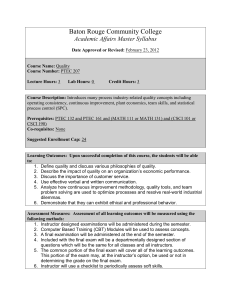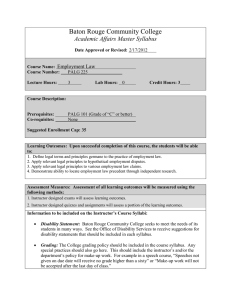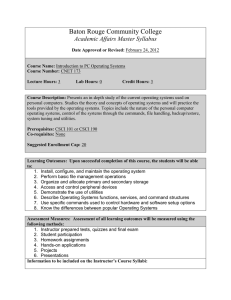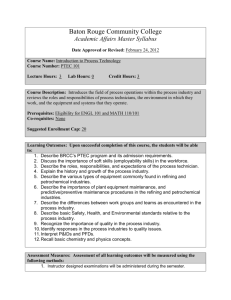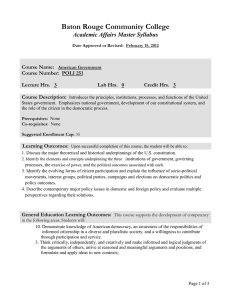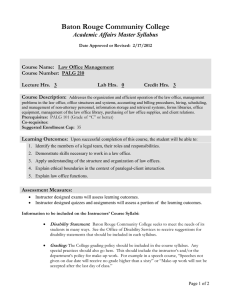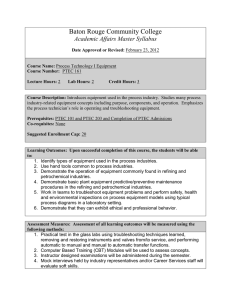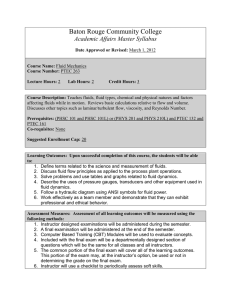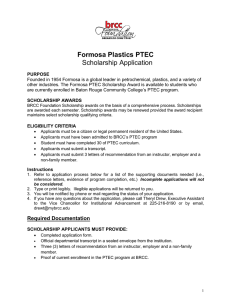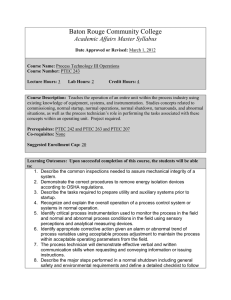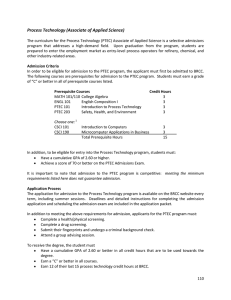Baton Rouge Community College Academic Affairs Master Syllabus
advertisement
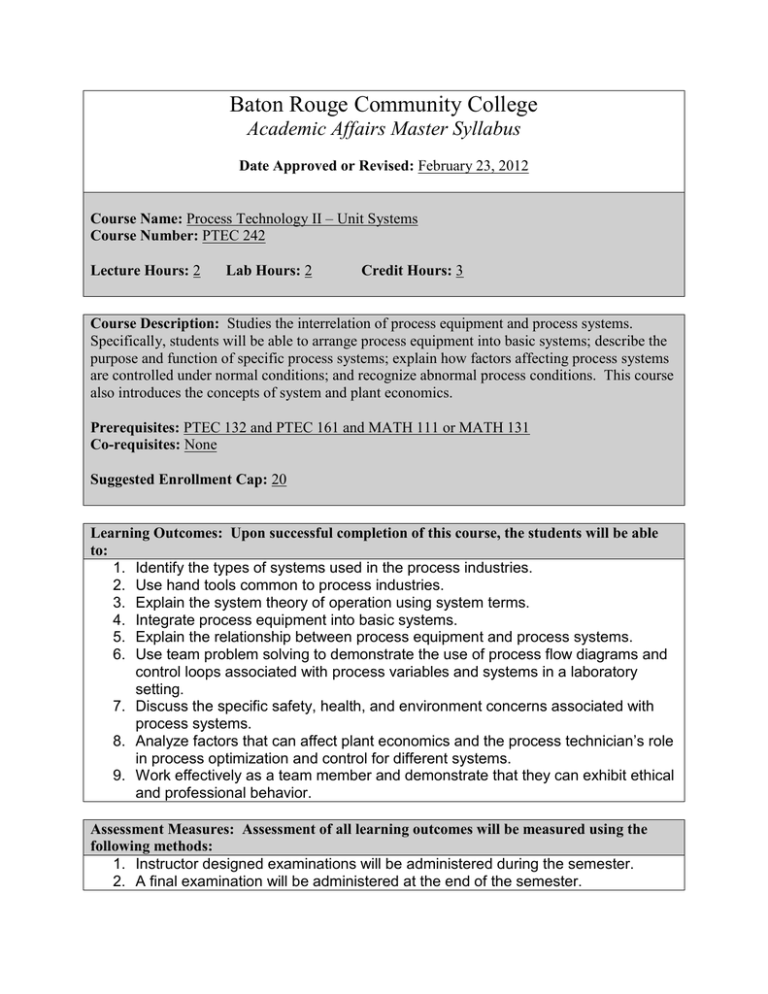
Baton Rouge Community College Academic Affairs Master Syllabus Date Approved or Revised: February 23, 2012 Course Name: Process Technology II – Unit Systems Course Number: PTEC 242 Lecture Hours: 2 Lab Hours: 2 Credit Hours: 3 Course Description: Studies the interrelation of process equipment and process systems. Specifically, students will be able to arrange process equipment into basic systems; describe the purpose and function of specific process systems; explain how factors affecting process systems are controlled under normal conditions; and recognize abnormal process conditions. This course also introduces the concepts of system and plant economics. Prerequisites: PTEC 132 and PTEC 161 and MATH 111 or MATH 131 Co-requisites: None Suggested Enrollment Cap: 20 Learning Outcomes: Upon successful completion of this course, the students will be able to: 1. Identify the types of systems used in the process industries. 2. Use hand tools common to process industries. 3. Explain the system theory of operation using system terms. 4. Integrate process equipment into basic systems. 5. Explain the relationship between process equipment and process systems. 6. Use team problem solving to demonstrate the use of process flow diagrams and control loops associated with process variables and systems in a laboratory setting. 7. Discuss the specific safety, health, and environment concerns associated with process systems. 8. Analyze factors that can affect plant economics and the process technician’s role in process optimization and control for different systems. 9. Work effectively as a team member and demonstrate that they can exhibit ethical and professional behavior. Assessment Measures: Assessment of all learning outcomes will be measured using the following methods: 1. Instructor designed examinations will be administered during the semester. 2. A final examination will be administered at the end of the semester. 3. Computer Based Training (CBT) Modules will be used to assess concepts. 4. Included with the final exam will be a departmentally designed section of questions which will be the same for all classes and all instructors. 5. The common portion of the final exam will cover all of the learning outcomes. This portion of the exam may, at the instructor’s option, be used or not in determining the grade on the final exam. 6. Instructor will use a checklist to periodically assess soft skills. Information to be included on the Instructor’s Course Syllabi: Disability Statement: Baton Rouge Community College seeks to meet the needs of its students in many ways. See the Office of Disability Services to receive suggestions for disability statements that should be included in each syllabus. Grading: The College grading policy should be included in the course syllabus. Any special practices should also go here. This should include the instructor’s and/or the department’s policy for make-up work. For example in a speech course, “Speeches not given on due date will receive no grade higher than a sixty” or “Make-up work will not be accepted after the last day of class.” Attendance Policy: Include the overall attendance policy of the college. Instructors may want to add additional information in individual syllabi to meet the needs of their courses. General Policies: Instructors’ policy on the use of things such as beepers and cell phones and/or hand held programmable calculators should be covered in this section. Cheating and Plagiarism: This must be included in all syllabi and should include the penalties for incidents in a given class. Students should have a clear idea of what constitutes cheating in a given course. Safety Concerns: In some programs this may be a major issue. For example, “No student will be allowed in the safety lab without safety glasses.” General statements such as, “Items that may be harmful to one’s self or others should not be brought to class.” Library/ Learning Resources: Since the development of the total person is part of our mission, assignments in the library and/or the Learning Resources Center should be included to assist students in enhancing skills and in using resources. Students should be encouraged to use the library for reading enjoyment as part of lifelong learning. Expanded Course Outline: I. Systems Overview, Potable and Fire Water Systems II. Soft Skills (Employability Skills) III. Service/Utility and Waste Water Systems IV. Cooling Water Systems V. Instrument Air, Utility Air and Breathing Air Systems VI. Nitrogen, Natural Gas and Fuel Gas systems VII. Relief and Flare Systems, Electrical Poser Generation and distribution systems VIII. Material Storage and Blending IX. Refrigeration systems X. Steam generation & Distribution Systems 1 XI. Steam generation & Distribution Systems 2 XII. Steam generation & Distribution Systems 3 XIII. Steam Generation & Distribution Systems 4 XIV. Reaction Systems XV. Separation Systems Overview and Extraction Systems XVI. Distillation systems XVII. Stripping Systems & Absorption Systems XVIII. Dehydration and adsorption systems XIX. Filtration systems, Separation Systems Comparison XX. Systems Procedures and Troubleshooting XXI. Control Systems XXII. System Economics and Optimization
